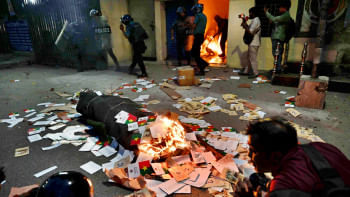KEPZ hamstrung by setbacks
 Kihak Sung, chairman of Youngone Corporation that owns KEPZ, speaks at a press conference at Sonargaon Hotel yesterday. Photo: Star
Kihak Sung, chairman of Youngone Corporation that owns KEPZ, speaks at a press conference at Sonargaon Hotel yesterday. Photo: Star
The Korean Export Processing Zone yesterday urged the government to remove the four impediments preventing full-scale operations at the specialised industrial area.
The KEPZ asked the government to execute the deed of transfers of the entire KEPZ lands, allow all types of industries, authorise KEPZ to lease out lands to other factories and restore electricity lines.
Korean Prime Minister Chung Hong-won also requested Bangladesh Prime Minister Sheikh Hasina to lift some restrictions on KEPZ, at a meeting recently.
“We have to work together to solve these problems,” Kihak Sung, chairman of KEPZ, said at a media briefing at Sonargaon Hotel.
Sung is scheduled to attend the 18th meeting of the board of governors of the private EPZ, a cell under the prime minister, on June 26 in Dhaka to explain what is holding them back from beginning operations in full swing.
KEPZ is now running with diesel generators as electricity connections were snapped in September 2012 by the authorities.
KEPZ received the operational licence in 2007, but the land transfer deed is yet to be executed, Sung said.
Currently, four shoe factories, out of eight, are in operation in KEPZ, he said.
The EPZ started its journey in 1999 on 2,492 acres of land in Chittagong, he added.
“I do not have plans to leave Bangladesh ever. Bangladesh comes first to me for business, China is second and Vietnam third,” said Sung, also chairman and chief executive of Youngone Corporation, a Korean company investing in Bangladesh.
His corporation has operations in Bangladesh, China and Vietnam and exports more than $1 billion of goods a year from the three countries.
The corporation seeks to build factories for leather products, shoes, bags, jackets, footwear, textiles, apparels, sporting goods, bicycles, toys, electrical and optical goods, accessories and supporting industries, IT zone, design and development centre, agro-based industries like fruits and vegetables processing and packing industries.
Youngone, which employs nearly 50,000 workers in its 17 factories mainly in garments in Dhaka and Chittagong export processing zones, has started another eight projects in KEPZ.
The project is expected to be complete by the first quarter of 2014.
“On completion, this project will create jobs for 40,000 people,” Sung said.
It took 14 years to complete the administrative process of KEPZ. As a result, operations were delayed, he added.
“Now we need strong ties between Korea and Bangladesh. Korea is the 13th largest economy worldwide. Bangladesh can immensely benefit from this friendship.”
KEPZ was registered in Bangladesh when Bangladesh Private EPZ Act 1996 was passed after a summit meeting of top-level leaders of both Bangladesh and Korea. The operational licence required under the law was given in May 2007, he said.
The company will form a fund of Tk 1.5 crore for fire and building safety accord in the cobuntry's garments sector, Sung added.

 For all latest news, follow The Daily Star's Google News channel.
For all latest news, follow The Daily Star's Google News channel. 



Comments